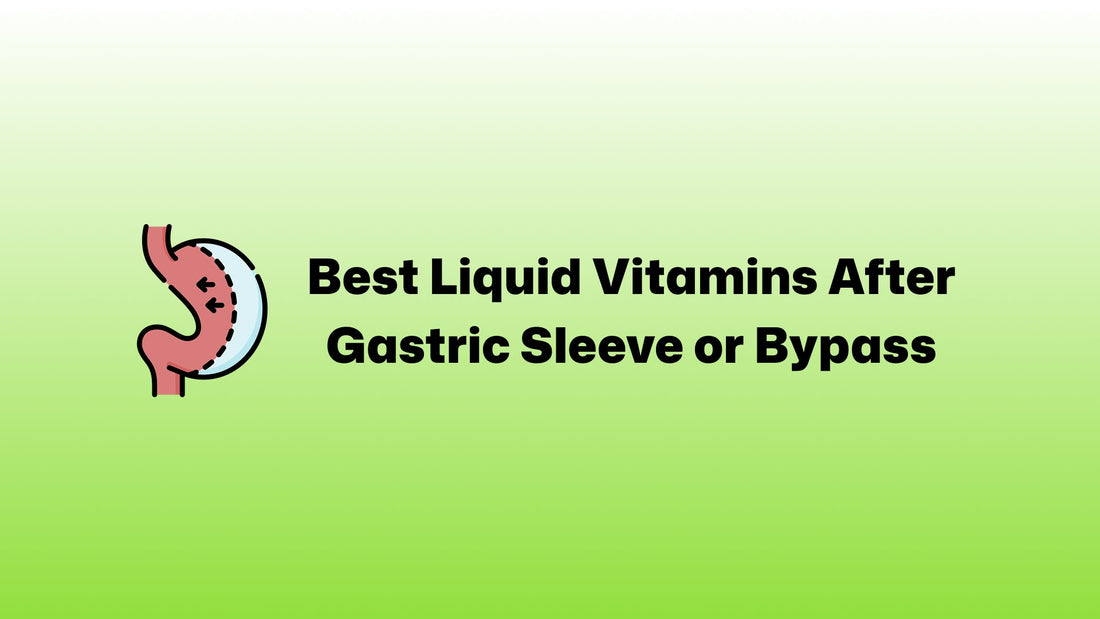
Best Liquid Vitamins After Gastric Sleeve or Bypass
Share
Best Liquid Vitamins After Gastric Sleeve or Bypass
Liquid bariatric vitamins are nutritional supplements formulated in liquid form, specifically for individuals who have undergone gastric sleeve or gastric bypass surgery. These surgical procedures reduce the stomach’s capacity and, in the case of bypass, also alter the digestive tract, significantly impacting nutrient absorption. As a result, patients require bariatric liquid vitamins to maintain nutritional balance and support recovery.
Unlike standard supplements, liquid multivitamin bariatric solutions are designed to be easily absorbed by the body, which is critical for post-operative patients who experience slower digestion and reduced stomach acid. Choosing the best liquid vitamins for bariatric patients ensures the body receives the essential nutrients it can no longer efficiently extract from food alone.
These liquid supplements are often the preferred form during early recovery, as they are easier to digest, gentler on the stomach, and offer faster absorption compared to tablets or chewables. Consistency in supplement intake plays a direct role in preventing long-term complications such as anemia, bone loss, or neurological issues.
Why Bariatric Patients Need Liquid Vitamins
Bariatric surgery, whether restrictive like gastric sleeve or malabsorptive like gastric bypass, leads to reduced nutrient absorption. The stomach's smaller size limits food intake, while changes in the digestive tract can prevent the full breakdown and assimilation of vitamins and minerals. This makes liquid bariatric multivitamins a fundamental part of long-term postoperative care.
Liquid bariatric vitamins are critical because they offer higher bioavailability. This means nutrients are more easily and efficiently absorbed, even when digestive function is compromised. For example, the body struggles to absorb certain nutrients like iron and calcium without adequate stomach acid, which is reduced after surgery. Liquid forms bypass this challenge by entering the bloodstream more directly.
Another benefit of bariatric vitamins all in one formulations is simplicity. Instead of managing multiple separate pills for different vitamins, a single liquid dose can deliver a full spectrum of micronutrients. This increases compliance, especially during the early post-op period when patients may struggle with nausea or appetite changes.
Moreover, some vitamin deficiencies can develop within weeks of surgery if not addressed. For instance, vitamin B1 (thiamine) deficiency may result in serious neurological effects. Using the best vitamins for bariatric patients in liquid form is both a preventive and therapeutic strategy that supports long-term health maintenance.
Essential Liquid Vitamins After Gastric Sleeve
After a gastric sleeve surgery, the stomach is significantly reduced in size, limiting the intake and digestion of nutrients. This surgical change impacts the absorption of several vitamins and minerals, especially those that rely on stomach acid or fat for proper assimilation. To prevent deficiencies, patients are advised to use bariatric sleeve vitamins in liquid form for better absorption and tolerance.
Liquid Multivitamins With Iron and Folate
Iron and folate are essential for red blood cell production, oxygen transport, and DNA synthesis. Post-gastric sleeve, the body's ability to absorb iron is compromised due to lower stomach acid levels, making liquid iron the preferred form. Folate supports cell growth and repair, especially important during rapid post-surgical weight loss and tissue healing.
A well-formulated liquid bariatric multivitamin ensures both iron and folate are included in therapeutic doses, helping prevent anemia and fatigue. This is especially critical for menstruating individuals who are at higher risk of deficiency.
Liquid multivitamin bariatric options with integrated iron and folate remove the need for separate supplements, making adherence easier. They also reduce gastrointestinal side effects common with tablet iron forms.
Liquid Vitamin B12
Vitamin B12 supports nerve function, cognitive clarity, and energy metabolism. After gastric sleeve surgery, B12 absorption declines sharply due to the loss of intrinsic factor production in the stomach. Symptoms of B12 deficiency include fatigue, numbness, and concentration problems.
Liquid bariatric vitamins that include B12 in methylcobalamin form allow for direct absorption in the mouth or stomach lining, bypassing the need for intrinsic factor. Regular intake of bariatric sleeve vitamins with liquid B12 prevents long-term neurological complications and supports overall energy levels.
Liquid Calcium Citrate with Vitamin D3
Calcium and Vitamin D3 are essential for maintaining bone density, which can be compromised after rapid weight loss and reduced calcium intake post-surgery. Calcium citrate is the preferred form because it does not require a high-acid environment for absorption.
A combination of liquid calcium citrate and Vitamin D3 in bariatric liquid vitamins ensures effective delivery and helps reduce the risk of osteoporosis and fractures. These nutrients also support muscle function and cardiovascular health.
Liquid Vitamin A, E, K
A, E, and K vitamins are important for immune function, antioxidant defense, vision, and blood clotting. After gastric sleeve surgery, fat digestion is often less efficient due to reduced intake and changes in bile flow, affecting the absorption of these vitamins.
Liquid bariatric vitamins containing emulsified or micellized forms of A, E, and K are more effectively absorbed in low-fat conditions. This is particularly important in the early postoperative phase, where dietary fat is often restricted for tolerance reasons.
Vitamin A supports vision and immune defense. Vitamin E acts as an antioxidant, protecting cells from damage during rapid weight loss. Vitamin K plays a central role in blood clotting and bone metabolism. Deficiencies in any of these can lead to vision issues, prolonged healing, or increased bleeding risk.
Including these fat-soluble nutrients in bariatric vitamins all in one formulations simplifies supplementation and helps maintain adequate levels over time. Best vitamins for bariatric patients must address these needs to ensure long-term metabolic and physiological stability.
Essential Liquid Vitamins After Gastric Bypass
Gastric bypass surgery not only restricts stomach size but also bypasses sections of the small intestine responsible for nutrient absorption. This malabsorptive nature increases the risk of vitamin and mineral deficiencies, making bariatric liquid vitamins essential for long-term health management.
Increased B12 and Iron Needs After Malabsorptive Procedures
Vitamin B12 and iron deficiencies are among the most common complications after gastric bypass. Due to bypassed segments of the small intestine and reduced stomach acid, these nutrients are poorly absorbed without targeted supplementation.
Liquid bariatric vitamins that include high doses of iron and B12 in bioavailable forms help prevent anemia, fatigue, and neurological decline. Iron should be in chelated or ferrous bisglycinate form to reduce gastrointestinal side effects and increase absorption.
Importance of Liquid Thiamine (B1) in Early Recovery
Thiamine (vitamin B1) plays a central role in energy metabolism and nerve conduction. After gastric bypass, deficiency can develop quickly, particularly in cases of vomiting or inadequate intake. Early signs of thiamine deficiency include irritability, muscle weakness, and memory issues.
Including thiamine in a liquid bariatric multivitamin is essential during the first few weeks after surgery. Liquid delivery allows for immediate absorption, reducing the risk of complications like Wernicke’s encephalopathy.
Zinc, Copper, and Selenium
Trace minerals such as zinc, copper, and selenium are essential for immune function, antioxidant activity, and wound healing. Gastric bypass compromises the body's ability to absorb these elements, especially when parts of the small intestine responsible for mineral uptake are bypassed.
Liquid bariatric vitamins containing these minerals in balanced ratios support postoperative recovery and protect against deficiency-related complications such as hair loss, skin issues, and slow wound healing. Zinc contributes to tissue repair and immune defense. Copper aids in red blood cell production and connective tissue strength. Selenium plays a role in thyroid function and oxidative stress control.
Best Liquid Vitamins for Bariatric Patients
The best liquid vitamins for bariatric patients are those that match the specific nutritional needs resulting from surgical alterations in digestion and absorption.
Key factors to consider when selecting the best vitamins for bariatric patients include:
- Inclusion of iron, folate, calcium citrate, vitamin D3, vitamin B12, and fat-soluble vitamins A, E, K
- Delivery in true liquid form (not powders or chewables) for maximum uptake
- Minimal use of sugar, artificial dyes, or non-essential fillers
Additionally, formulations labeled as bariatric vitamins all in one reduce complexity and support better adherence, especially in the early months post-surgery when patients may experience taste changes or digestive sensitivity.
How to Use Liquid Vitamins Safely After Surgery
Patients should begin supplementation immediately after surgery, or as recommended by their bariatric team. The first weeks are critical, as nutrient reserves deplete rapidly due to limited food intake and malabsorption. A structured regimen using a bariatric liquid vitamins product tailored for post-op needs provides early protection against common deficiencies.
To avoid nutrient competition, calcium and iron should be taken at least two hours apart. Taking both together can reduce absorption efficiency. For example, calcium can interfere with iron uptake, even in liquid multivitamin bariatric solutions.
It's essential to pair liquid bariatric multivitamin intake with routine blood testing, typically every 3 to 6 months during the first year, and annually thereafter. These labs guide adjustments in dosage and ensure nutritional targets are being met.
Building a Post-Bariatric Supplement Routine
Establishing a consistent supplementation routine is essential for long-term success after gastric sleeve or bypass surgery. Nutritional deficiencies may not appear immediately but can cause irreversible health issues over time if left unaddressed. A structured, sustainable approach using liquid bariatric vitamins reduces this risk and supports ongoing recovery.
When additional nutrients like calcium or B12 are needed separately, they should be spaced appropriately. For example, calcium should not be taken with iron, even in bariatric vitamins all in one solutions. Spacing these doses avoids nutrient competition and maximizes absorption.
Tracking supplement intake using a journal or app can help prevent missed doses. Pairing best multivitamin for gastric sleeve patients with regular lab testing ensures any emerging deficiencies are addressed promptly.
